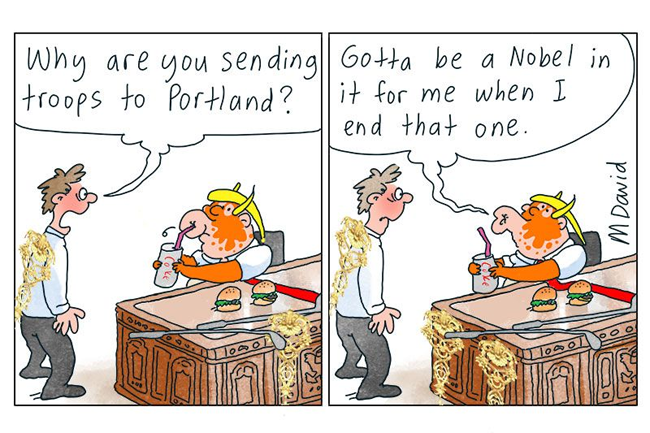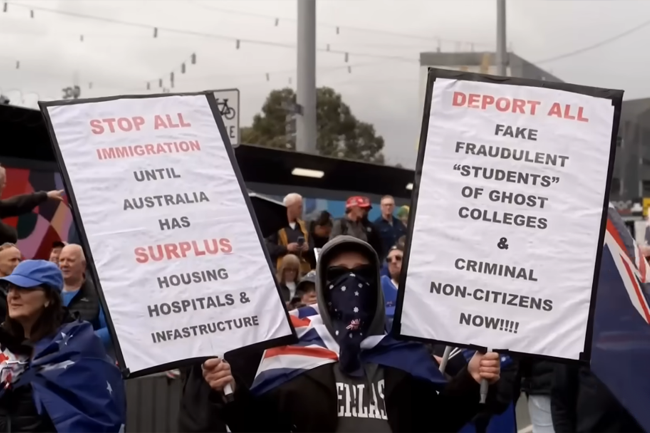Mitchell's constant references to getting drunk might account for the lapses in taste, judgment, memory and ethics in Making Headlines, writes Dr Martin Hirst.
READING THE first few chapters of Chris Mitchell’s hastily written memoir Making Headlines, it’s easy to get the impression that the editor-in-chief of The Australian was not only editing what he unselfconsciously describes as the ‘best political paper’ in the country, he was also running the country from NewsCorpse’s Holt Street bunkers in Sydney’s Surry Hills.
It seems that prime ministers, treasurers and leading politicians from both major parties were super keen to get Mitchell’s advice about policy pronouncements, cabinet appointments and which hand they should use to wipe their arses.
Five of the 12 chapters are devoted to Mitchell’s recollections of his – and The Australian’s – relationships with prime ministers. Alongside his character assessments of them, Mitchell recounts numerous instances of invitations to prime ministerial digs – the Lodge in Canberra and Kirribilli House in Sydney – and secret and not-so-secret rendezvous with the PM to discuss government policy, ministerial appointments and political tactics.
Perhaps the most bizarre of these secret meetings is the one that Mitchell says took place in the sauna room of a Sydney hotel at the invitation of recently-deposed PM Kevin Rudd. A section of the chapter on Rudd has been reprinted in The Australian and it certainly paints Rudd in a very peculiar light.
'Incredibly, the then foreign minister and I, both in business suits and ties, were to be served in the sauna room, which was to be off limits to all apart from us and the waiters who would look after us at the silver service table they had set up inside. Steam off, of course.'
Mitchell and Rudd knew each other well and, in Mitchell’s account, they were in frequent contact before during and after the Rudd prime ministership. Apart from the many meals they shared – always opportunities for Rudd to seek advice according to Mitchell – there were frequent calls. Most of them were initiated by Rudd and one such call was made from the Great Wall in China.
Mitchell’s account of this call in November 2006 is that Rudd was seeking a "favour" from him — the commissioning of a Newspoll to test the popularity of a Rudd+Gillard ticket to overthrow the then Beazley+Macklin leadership of the ALP opposition.
It was a request that Mitchell was happy to accede to — for the good of the paper, not the good of the nation:
Obviously I discussed it with [then political editor] Dennis Shanahan and we worked out the pros and cons of doing it, because we had to work with the Opposition team that was there at the time," he said.
I was sceptical of the idea of Kevin and Julia forming a team and sceptical with some good reason, hindsight tells me.
I think the truth is he wouldn't have got the numbers alone because she brought the weight of the party room with her.
The book is littered with stories like this. In fact, that is really all that Making Headlines consists of — a mishmash of anecdotes designed to bathe Mitchell in glory, usually at the expense of the other parties involved.
Mitchell admits early in the book that he has not bothered to check his recollections against those of the other protagonists in this saga, so a lot of his claims could be exaggeration and hyperbole, but there is no doubt that he did wield some power from his expansive office on Mahogany Row.
However, Mitchell has been taken to task for the way he has liberally sprinkled his recollection of events with long, supposedly verbatim quotes from conversations he’s had with senior political figures, journalists and newsmakers.
One such lengthy quote stands out for me and I’m surprised that Mitchell can remember it as clearly as he claims to as, by his own admission, the conversation took place after ‘three bottles of my chardonnay and shiraz’ Mitchell consumed one summer afternoon with Tony Abbott:
Given Mitchell’s predilection for scoffing "a large shiraz" at every opportunity it is surprising that he remembers this conversation at all, let alone with such clarity that he can quote himself and Abbott word-for-word two years after the event.
The other telling point about the long anecdote cited here is Mitchell’s indiscretion in relation to what should have been an off-the-record chat with a serving prime minister. But Mitchell cannot help himself.
In an effort to prove his own worth, Mitchell often comments about the sobriety (or not) of his many lunch and dinner companions or drinking buddies:
‘By now he [Abbott] was very, very loose.’
At times, it seems Mitchell goes out of his way to let the reader know that his confidants, or those seeking his advice, would often get tipsy – if not outrageously pissed – during their tête-à-tête. It is moments like these in the book that show glimpses of Mitchell’s enormous ego and self-regard.
Indeed, one review of Making Headlines describes the book as Mitchell’s ‘love letter to himself’. It certainly reads that way, often enough. David Fagan’s review for The Conversation is brief and reasonably balanced. Fagan has previously worked with Mitchell and like Mitchell spent time as editor of Brisbane’s Courier-Mail.
I agree with Fagan’s assessment that Mitchell’s book leaves readers with the impression that he is a genius and that most of his contemporaries – particularly at the ABC, the Guardian and the Fairfax mastheads – are two-bob shy of a pound.
David Fagan:
'Indeed, it is hard to find anyone on these pages matching the wisdom Mitchell has carried through the two decades he describes editing The Australian and The Courier-Mail in Brisbane. A handful of journalists he describes as friends have helped, but pretty well everyone else has failed to meet his standards.'
Mitchell’s high opinion of himself runs with the ink on nearly every page of this book and, after a couple of chapters, the constant references to being telephoned at all hours by prime ministers wanting advice or seeking The Australian’s endorsement for a policy or political position become boring, tedious and, frankly, nauseating.
I found myself hoping that Mitchell was lying, or at least embellishing, these anecdotes for the sake of making the book a good read but, to my horror, I think he’s probably telling the truth.
And that’s a good thing. It lays bare what many of us have felt for a long time: governments govern in Australia at Rupert’s pleasure. We are not imagining the state of symbiosis between senior politicians from both major parties and the interests of the Murdoch press.
Mitchell has given us the proof, chapter after chapter, of the power wielded by Murdoch through his proxies — senior editorial executives like Mitchell.
At least Mitchell is honest enough to admit that The Australian both seeks and covets the power it appears to have over Australia’s political elite.
Mitchell’s ego is also such that he has no shame in boasting about it:
'Part of the increased influence of The Australian since the mid-2000s [Mitchell became editor in 2003] is undoubtedly attributable to my long-term friendship with one man…Kevin Rudd.'
I doubt that this friendship is intact following publication of Making Headlines, because Mitchell pours literal buckets of shit over Rudd in this book — as he does to Abbott and Gillard in the respective chapters about them.
I was curious as to why Mitchell chose Malcolm Turnbull to launch Making Headlines. I thought Tony Abbott would have been a better fit. But, after reading the book, I understand why Abbott might have told the author to shove it where the sun don’t shine. In the Prologue, Mitchell writes that he believes Abbott should have left politics after his dumping by the party room revolt of September 2015.
"This is a guy who loved every minute of his professional life in newspapers" ~ PM Malcolm Turnbull said launching Mitchell's book.
Mitchell is also open about having ‘betrayed some confidences of all the prime ministers I have dealt with’ and he justifies it without an ounce of remorse, self-doubt or self-reflection.
'This is fair enough since I have retired and they have all left politics, apart from Tony Abbott, who probably should have left before I did.'
Having read the book from cover to cover and having followed much of the media commentary about it, I have formed the view that Mitchell is a callous narcissist. He twice mentions the suicide of people who were subject to unflattering stories in newspapers he was editing. He shows no remorse for this and offers no apology. In my view, this shows a disregard for others and a disregard for the MEAA journalists’ Code of Ethics, as does his deliberate betrayal of sources and people with whom he claims to have had close relationships – and even friendships with – over the past three decades.
Mitchell is also a man riven by contradictions. At several points in the book, he is dismissive of the Walkley Awards – the highest accolade an Australian journalist can receive for their work – when they are given to journalists from rival media organisations. Yet, he is not shy in claiming the credit when a journalist working under his watch picks up a Walkley for a story they’ve done.
The word hypocrite comes to mind, but I’ll leave that for others to judge once they’ve read the book for themselves.
I’ve written previously for IA that I have a ‘grudging respect’ for Chris Mitchell, and certainly his knowledge of and insight into, the state of journalism today is worth considering. The chapters that discuss issues such as paywalls, the decline in solid investigative journalism and the confusing state of the news business today are a valuable contribution to the debate — even if only as a jumping off point for a strong critique of his views and position.
But even these chapters, thoughtful as they are, are spoiled by Mitchell’s ego getting in the way.
He is dismissive of journalism educators and writes them off as an homogenous group who have taken ideological positions opposed to the Murdoch empire in general and to The Australian in particular.
He claims – I think erroneously – that the Finkelstein inquiry of 2011 was a giant Labor/Greens conspiracy to silence critics of the Gillard Government and he also claims (again wrongly) that this conspiracy was aided and abetted by journalism educators.
I can assure you that this was not the case. Journalism educators – and I am one – were just as divided on the issues and recommendations highlighted by the Finkelstein inquiry as everyone else. There was not then and there is not now, a consensus among journalism teachers and scholars on the issues of monopoly media ownership or government regulation of the news media.
It is a symptom of Mitchell’s own ideological blindness and massive ego that he cannot see the contradiction in lambasting what he calls ‘activist journalists’ and his boastful recounting of all the "campaigns" that various Murdoch mastheads have indulged in under his leadership.
Mitchell is also blind to the obvious conservative bias that many readers can clearly see in The Australian’s news pages. His claims that the paper is ‘straight’ in its news pages ring hollow to critics of the Murdoch press, who recognise that many of its front page "exclusives" are no more than selective drops from the offices of government ministers. I have come to call this type of story the "excusive".
I wrote this in 2014, at the height of the Murdoch press’ cheerleading for Tony Abbott, the situation is slightly different with Turnbull as PM, but the principles still stand:
An “exclusive” in the newspaper world was always something that a reporter could be proud of and that an editor would get juicy over because it had the potential to increase sales and generate ‘buzz’ about the paper and the story. For a journalist, an exclusive meant free drinks at the bar, a pat on the back and a chance of promotion.
But, today at The Australian the EXCLUSIVE has become devalued to the point of worthlessness and over-used to the point of terminal boredom and cynicism on the part of the reader. More disturbingly it has morphed into what I am calling the EXCUSIVE, a story that provides political cover and excuses for the actions of the Abbott government. The Australian is now a mouthpiece and a megaphone for pro-Abbott propaganda.
The Australian under the stewardship of Paul "Boris" Whittaker still provides a shrill, if sometimes critical, Greek chorus for Turnbull and, increasingly, the right of the Liberal Party, the anti-equality Christian right and the climate-change deniers.
There is the obligatory homage to Rupert Murdoch in Making Headlines and it confirms the thesis that Rupert appoints editors in his own image. In the chapter praising Murdoch’s business and editorial acumen, Mitchell does not hide his love of Rupert.
'I like Rupert, and my mind works much the way his does,’ Mitchell writes. It is a line I’ve heard before.
When I questioned Paul Kelly about his relationship with Murdoch 15 years ago in front of my University of Queensland journalism students, he said much the same thing and recounted a story of how he got to be editor-in-chief of The Australian after spending time with Murdoch at his California residence. Mitchell’s experience mirrors this. Perhaps it is an upscale version of the Stockholm Syndrome.
At the end of this book, I am left wondering how Mitchell had the time to run his busy empire and offer advice to every prime minister since John Howard.
I’m not sure, as much of the narrative – such as it is – revolves around Mitchell drinking and eating. There’s copious amounts of champagne, chardonnay and shiraz drunk and plenty of expensive food consumed. It seems that Mitchell is eating and drinking on every page of this book, and that most of his meetings with the great and good involve both parties becoming slightly sozzled during the course of their discussions.
Perhaps this explains Mitchell’s corpulent frame and ruddy complexion. It might also account for the lapses in taste, judgment, memory and ethics that litter this otherwise unremarkable tome.
Read more by Dr Martin Hirst on his blog Ethical Martini and follow him on Twitter @ethicalmartini.

This work is licensed under a Creative Commons Attribution-NonCommercial-NoDerivs 3.0 Australia License
Monthly Donation
Single Donation
Keep informed. Subscribe to IA for just $5.









